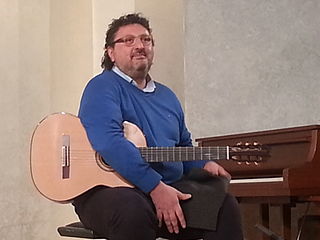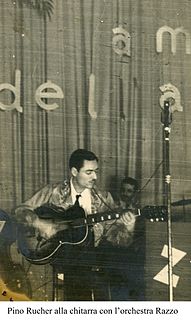Related Research Articles
Ennio Morricone, OMRI was an Italian composer, orchestrator, conductor, and trumpet player who wrote music in a wide range of styles. Morricone composed more than 400 scores for cinema and television, as well as more than 100 classical works. His score to The Good, the Bad and the Ugly (1966) is considered one of the most influential soundtracks in history. It was inducted into the Grammy Hall of Fame. His filmography includes more than 70 award-winning films, all Sergio Leone's films since A Fistful of Dollars, all Giuseppe Tornatore's films since Cinema Paradiso, The Battle of Algiers, Dario Argento's Animal Trilogy, 1900, Exorcist II, Days of Heaven, several major films in French cinema, in particular the comedy trilogy La Cage aux Folles I, II, III and Le Professionnel, as well as The Thing, Once Upon a Time in America, The Mission, The Untouchables, Mission to Mars, Bugsy, Disclosure, In the Line of Fire, Bulworth, Ripley's Game, and The Hateful Eight. Morricone is widely regarded as one of the greatest and most influential film composers of all time.

Hercules is a 1983 science fantasy adventure film written and directed by Luigi Cozzi and starring Lou Ferrigno. The film is based on Greek mythology and follows the exploits of Hercules.
"Samba pa ti" is an instrumental by Latin rock band Santana, from their 1970 album, Abraxas. In English, the title means "Samba for You." It was released as a single in 1973. The song charted at #11 in the Netherlands, #43 on the German charts,, and #27 on the UK Singles Chart, Santana's first single to chart in the United Kingdom.
We All Love Ennio Morricone is a 2007 tribute album honoring noted film composer Ennio Morricone. It features a diverse lineup of artists including Andrea Bocelli, Metallica, Bruce Springsteen, Roger Waters, and Celine Dion. Also, industry giant Quincy Jones, an admirer of Morricone’s work as a composer for many years, enlisted his longtime songwriting collaborators Alan and Marilyn Bergman to write the lyrics to "I Knew I Loved You", which Dion sang to Morricone’s "Deborah's Theme" from Once Upon a Time in America. Bruce Springsteen won the Grammy Award Best Rock Instrumental Performance for his version of "Once Upon A Time In The West", beating out Metallica who was nominated for their cover of "The Ecstasy of Gold", also from this album. The album sold over 120,000 copies in Italy alone

The Good, the Bad and the Ugly: Original Motion Picture Soundtrack was released in 1966 alongside the Western film, The Good, the Bad and the Ugly, directed by Sergio Leone. The score is composed by frequent Leone collaborator Ennio Morricone, whose distinctive original compositions, containing gunfire, whistling, and yodeling permeate the film. The main theme, resembling the howling of a coyote, is a two-note melody that is a frequent motif, and is used for the three main characters, with a different instrument used for each one: flute for Blondie, arghilofono (Ocarina) for Angel Eyes, and human voices for Tuco.

Allonsanfàn is a 1974 Italian historical drama film written and directed by Paolo and Vittorio Taviani, with a score composed by Ennio Morricone.

Aniello Desiderio is an Italian virtuoso classical guitarist and teacher, professor at the Conservatorio Domenico Cimarosa in Avellino. He is known for his intricate touch, speed and precision on the instrument, delivering "acrobatic arpeggios and scales of extraordinary brilliance", which has led to comparisons with Paganini. He is particularly renowned for his interpretations of Paganini, Scarlatti, Carulli, and lesser known Italian composers on a world scale.
Andrea Morricone is an Italian composer and conductor, known for his film scores. He is the son of composer Ennio Morricone. He composed the film scores for the American films Capturing the Friedmans and Liberty Heights. He collaborated with his father on the score for Cinema Paradiso, for which they won a BAFTA Award for For Best Original Film Music. The Love Theme from Cinema Paradiso is a work by Andrea Morricone. He has also composed music for many other Italian films, including The Inquiry and The Entrepreneur.
"The Good, the Bad and the Ugly" is the theme to the 1966 film of the same name, which was directed by Sergio Leone. Included on the film soundtrack as "The Good, the Bad and the Ugly ", the instrumental piece was composed by Ennio Morricone, with Bruno Nicolai conducting the orchestra. A cover version by Hugo Montenegro in 1968 was a pop hit in both the U.S. and the U.K. It has since become one of the most iconic scores in film history.

Gruppo di Improvvisazione Nuova Consonanza was an avant-garde free improvisation group considered the first experimental composers collective.

Paradiso is an international album by Christchurch, New Zealand soprano Hayley Westenra, in collaboration with Italian maestro Ennio Morricone. It was released worldwide beginning 18 April 2011 in New Zealand.

"Here's to You" is a song by Ennio Morricone and Joan Baez, released in 1971 as part of the soundtrack of the film Sacco & Vanzetti, directed by Giuliano Montaldo. The song was written by Baez and Morricone themselves. The lyrics are only 4 lines of text, sung over and over.
Crime and Dissonance is a 2005 compilation album of Italian composer Ennio Morricone's film score work. Intended as a follow-up to two earlier Morricone compilations assembled by Dagored, the album was put together by Alan Bishop and released by Ipecac Recordings. Crime and Dissonance features work ranging from the later 1960s to the early 1980s, and contains scores taken from films of several different genres.

Django Unchained is the soundtrack to Quentin Tarantino's motion picture Django Unchained. It was originally released on December 18, 2012. The soundtrack uses a variety of music genres, relying heavily on spaghetti western soundtrack.

Pino Rucher was an Italian guitarist active in orchestral settings and in film soundtracks.

The Hateful Eight is the soundtrack album to Quentin Tarantino's motion picture The Hateful Eight. The soundtrack includes the first complete original score for a Tarantino film and is composed, orchestrated and conducted by Ennio Morricone. Morricone composed 50 minutes of original music for The Hateful Eight.
References
- 1 2 Morricone, Ennio (1 February 2019). De Rosa, Alessandro (ed.). Ennio Morricone: In His Own Words. Oxford University Press. pp. 80, 330. ISBN 978-0-19-068103-6.
- ↑ "Intervista con Bruno Battisti D'Amario". Blogfoolk. Retrieved 29 August 2020.
- ↑ Seffer, Vanessa. "Bruno Battisti D'Amario: "Io, Morricone e quelle nostre affinità elettive"". Il Giornale OFF. Retrieved 29 August 2020.
- ↑ Sciannameo, Franco (2020). Reflections on the Music of Ennio Morricone: Fame and Legacy. Rowman & Littlefield. p. 92. ISBN 978-1-4985-6901-9.
- ↑ "Bruno Battisti D'Amario (Guitar)". Bach Cantatas Website. Retrieved 29 August 2020.
- ↑ "The Feedback". Light In The Attic Records. Retrieved 29 August 2020.
- ↑ Wierzbicki, James (8 February 2019). Double Lives: Film Composers in the Concert Hall. Taylor & Francis. p. 146. ISBN 978-0-429-67149-4.
- ↑ Aguzzi, Andrea. "Four Pieces for guitar by Ennio Morricone on #neuguitars #blog". Neuguitars. Retrieved 30 August 2020.
- ↑ D'Amario, Bruno. Tarot cards: meditation and music. Gangemi Editore. ISBN 9788849270532 . Retrieved 29 August 2020.